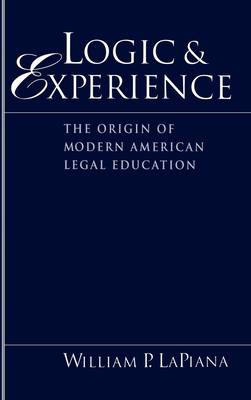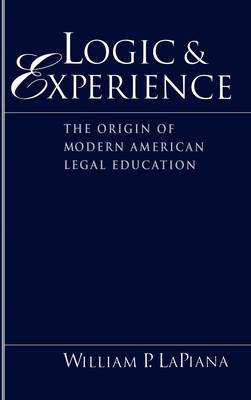
- Retrait gratuit dans votre magasin Club
- 7.000.000 titres dans notre catalogue
- Payer en toute sécurité
- Toujours un magasin près de chez vous
- Retrait gratuit dans votre magasin Club
- 7.000.000 titres dans notre catalogue
- Payer en toute sécurité
- Toujours un magasin près de chez vous
Logic and Experience
The Origin of Modern American Legal Education
William P Lapiana
Livre relié | Anglais
179,95 €
+ 359 points
Description
The nineteenth century saw dramatic changes in the legal education system in the United States. Before the Civil War, lawyers learned their trade primarily through apprenticeship and self-directed study. By the end of the nineteenth century the modern legal education system, developed primarily by Dean Christopher Langdell at Harvard University, was in place: a bachelor's degree was required for admission to the new model law school, and a law degree was promoted as the best preparation for admission to the bar. In Logic and Experience: The Origin of Modern American Legal Education, William LaPiana provides an in-depth study of the intellectual and institutional history of the transformation of American legal education during this period. He thoughtfully details the evolution and adoption of the modern method - the case method - of legal pedagogy that was developed at Harvard and that supplanted the earlier commitment to the memorization of legal principles which was most practiced at Yale. LaPiana links the spread of the Harvard style to changing ideas about the social role of the legal profession. He reveals that practitioners in the American Bar Association, often assumed to be friends of the new style education, were deeply opposed to it. Through this history of American legal education, LaPiana offers a revisionist portrait of Langdell, Dean of Harvard Law School from 1870 to 1895, and the earliest proponent for the modern method of legal education. Placing Langdell and his colleagues into a broader intellectual and cultural context, LaPiana demonstrates that the usual portrayal of Langdell and his colleagues as formalists is faulty. Logic and Experience offers a provocativeanalysis of the development of the American law school and a powerful discussion of the controversy that surrounded these developments both at the time and today. It will provide insightful and informative reading for lawyers, students and scholars of legal, American, and inte
Spécifications
Parties prenantes
- Auteur(s) :
- Editeur:
Contenu
- Nombre de pages :
- 264
- Langue:
- Anglais
Caractéristiques
- EAN:
- 9780195079357
- Date de parution :
- 20-01-94
- Format:
- Livre relié
- Format numérique:
- Genaaid
- Dimensions :
- 162 mm x 235 mm
- Poids :
- 576 g







